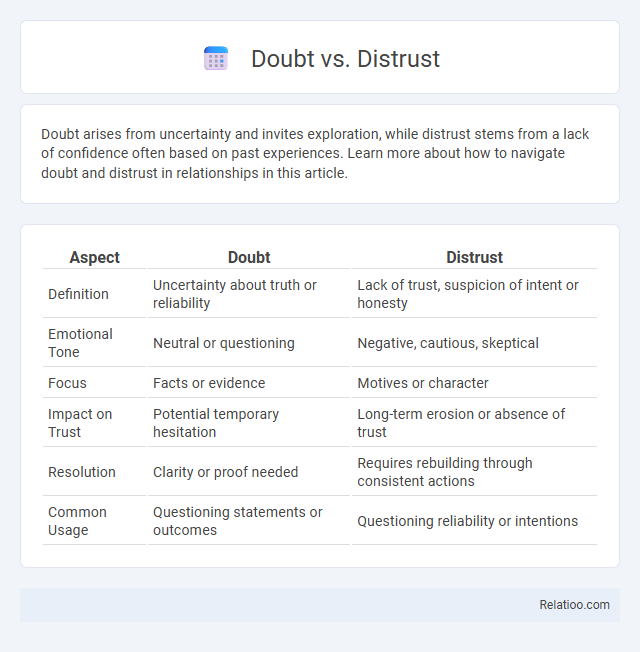Doubt arises from uncertainty and invites exploration, while distrust stems from a lack of confidence often based on past experiences. Learn more about how to navigate doubt and distrust in relationships in this article.
Table of Comparison
| Aspect | Doubt | Distrust |
|---|---|---|
| Definition | Uncertainty about truth or reliability | Lack of trust, suspicion of intent or honesty |
| Emotional Tone | Neutral or questioning | Negative, cautious, skeptical |
| Focus | Facts or evidence | Motives or character |
| Impact on Trust | Potential temporary hesitation | Long-term erosion or absence of trust |
| Resolution | Clarity or proof needed | Requires rebuilding through consistent actions |
| Common Usage | Questioning statements or outcomes | Questioning reliability or intentions |
Understanding Doubt and Distrust: Key Definitions
Doubt is the feeling of uncertainty or lack of conviction about the truth or reliability of something, while distrust involves a deeper suspicion or belief that someone or something is untrustworthy. Understanding these key definitions helps your ability to recognize when hesitation stems from simple uncertainty (doubt) versus a lack of confidence based on previous evidence (distrust). Differentiating between these emotions is crucial for making informed decisions in personal and professional contexts.
The Psychological Roots of Doubt and Distrust
Doubt and distrust both stem from psychological mechanisms involving uncertainty and threat assessment, but they differ in focus and emotional impact. Doubt arises from cognitive processes questioning the validity of information or beliefs, often triggered by ambiguous evidence that prompts Your mind to seek clarity and reassurance. Distrust is rooted in emotional responses shaped by past experiences and perceived risks, leading to a protective stance against potential deceit or harm.
How Doubt Differs from Distrust: Core Distinctions
Doubt involves a temporary state of uncertainty or lack of conviction about information or outcomes, often based on insufficient evidence. Distrust, however, reflects a deeper skepticism rooted in the anticipation that someone or something may intentionally cause harm or fail to meet expectations. Understanding these core distinctions helps you navigate interpersonal relationships and decision-making by clarifying when caution is warranted versus when to seek more information.
The Role of Experience in Shaping Doubt and Distrust
Your experiences play a crucial role in shaping doubt and distrust, with doubt often arising from uncertainty and lack of information, while distrust stems from negative past encounters or breaches of trust. Doubt signals a need for more evidence before forming a conclusion, whereas distrust reflects a deeper skepticism rooted in experience. Understanding these distinctions helps you navigate relationships and decisions more effectively.
Impacts of Doubt and Distrust on Relationships
Doubt creates uncertainty that can prompt critical thinking and foster deeper understanding in relationships, but persistent doubt may erode trust and emotional connection. Distrust, rooted in suspicion or past betrayals, often leads to defensive behaviors and emotional distance, damaging communication and intimacy with Your partner or friends. Both doubt and distrust negatively impact relationship stability but addressing them openly can help rebuild trust and strengthen bonds over time.
Doubt vs Distrust in Decision Making
Doubt and distrust play distinct roles in decision making, with doubt referring to uncertainty or hesitation about the validity of information or outcomes, while distrust implies a lack of confidence in the integrity or reliability of people or systems involved. Your decision-making process benefits from recognizing doubt as an internal questioning tool that encourages further evaluation, whereas distrust signals a deeper skepticism that may require verification or reassessment of sources. Effective differentiation between these concepts helps you navigate risks and build informed, confident choices.
Social and Cultural Influences on Doubt and Distrust
Doubt and distrust are shaped significantly by social and cultural contexts, influencing how individuals perceive trustworthiness within communities. Cultural norms and social experiences dictate the level of skepticism people apply, with some cultures fostering more communal trust while others emphasize caution and individual judgment. Social interactions, historical relationships, and collective memory also contribute to developing doubt or distrust, affecting interpersonal and institutional confidence.
Overcoming Doubt: Strategies for Clarity
Overcoming doubt requires identifying its root causes and challenging negative assumptions with evidence-based reasoning. Building self-confidence through small, achievable goals sharpens your clarity and reduces uncertainty in decision-making. Consistent reflection and seeking feedback from trusted sources strengthen your ability to differentiate doubt from distrust or sheer skepticism.
Rebuilding Trust After Distrust
Rebuilding trust after distrust requires consistent transparency, honest communication, and demonstrable reliability to repair the emotional breach caused by previous doubts or suspicions. You must acknowledge the underlying causes of distrust and actively engage in actions that reinforce accountability and empathy. Establishing clear boundaries and setting mutual expectations plays a crucial role in restoring confidence and fostering a healthy, trustworthy relationship moving forward.
Doubt and Distrust: Implications for Personal Growth
Doubt challenges Your beliefs, prompting critical thinking and fostering personal growth by encouraging exploration and self-awareness. Distrust, however, creates barriers to relationships and communication, hindering emotional development and collaboration. Understanding the distinct impacts of doubt and distrust allows You to navigate uncertainty constructively while maintaining healthy interpersonal connections.

Infographic: Doubt vs Distrust
 relatioo.com
relatioo.com